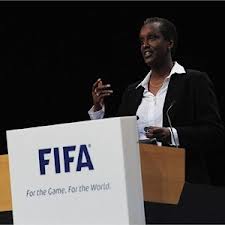By Andrew Warshaw in Mauritius
May 31 – Lydia Nsekera of Burundi became the first ever elected female member of FIFA’s executive committee today but her victory was shrouded in alleged politics despite football’s world governing body striving for new transparency and openness.
Nsekera, already on the top table on an interim basis as a co-opted executive committee member, beat off her two rival candidates for the inaugural four-year elected post, with Moya Dodd of Australia and Sonia Bien-Aime of the Turks and Caicos Islands given the consolation prize of one-year co-opted positions – the same role Nsekera previously held.
Nsekera took 95 votes at the FIFA Congress, with Dodd receiving 70 and Bien-Aime 38. A fourth original contender, Paula Kearns of New Zealand, withdrew from the bidding on the eve of the vote.
While bringing three women on to the executive committee has quite rightly been hailed as a major step forward in terms of pulling FIFA into the modern age, allegations swirled around the various Congress gatherings here that political manoevrings had played as great a role as the credentials of the respective candidates in the battle for the permanent position.
This time last year, Nsekera was parachuted on to the executive committee on the personal recommendation of FIFA president Sepp Blatter, much to the irritation of other senior FIFA officials who believe Blatter acted unilaterally and that the whole system was flawed.
It is understood she has since made little contribution in executive committee meetings and high-ranking sources, one of whom described her lack of involvement as “scary”, believe her new upgraded role is directly linked with the FIFA presidential election in two years’ time with possible rivals Blatter and Michel Platini keen to secure potential African backing two years ahead of time.
Europe did not put forward a woman candidate and, with its 53 members, therefore became fertile lobbying territory. Tellingly, Dodd, a vice-president of the Asian Football Confederation, was a highly visible figure at the UEFA Congress in London last week when she stepped up an intensive lobbying programme.
At that point she was reasonably confident of victory but her optimism faded in the final few days before voting and she ultimately found herself unable to catch Nsekera, only the second woman to preside over a football association in Africa as head of the Burundian FA.
Despite those positions and the fact that Nsekera was a member of FIFA’s organising committee for the 2008 and 2012 Olympic football tournaments and is a serving member of the International Olympic Committee, Dodd supporters still cried foul.
“The whole system was flawed from the start and a ridiculous way to go about things because it obviously gave Lydia a head start,” said one. “Why didn’t we go for an elected position there and then? I’m not sure it was based on credentials, more on image and perception. Everyone is pandering to the African vote.”
Arguments and personalities aside, it has to be said that today represented a pivotal day for women’s football which has suddenly been catapulted into the higher echelons of FIFA and in her pre-vote address, Nsekera said she was totally committed to her sport.
“As I have for a long time, I will continue to raise awareness for women in sport to maintain their training,” she said. “I also want to raise awareness among women so they can be elected to leadership bodies.”
Also raising the status of women among the FIFA hierarchy was the election earlier of South African Sindi Mabaso-Koyana as deputy chairman of FIFA’s Audit and Compliance committee.
Contact the writer of this story at moc.l1743778942labto1743778942ofdlr1743778942owedi1743778942sni@w1743778942ahsra1743778942w.wer1743778942dna1743778942
